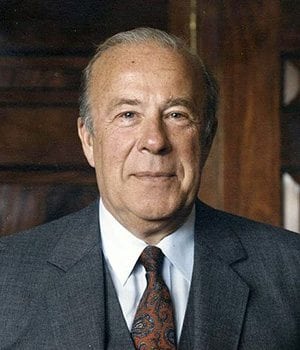Dr. George P. Shultz, In Memorium (1920-2021)
Former Secretary of Labor, Treasury, State and Director of the Office of Management and Budget
“I support what Citizens’ Climate Lobby is doing and I support your Carbon Fee and Dividend solution. It’s interesting to see a grassroots organization who’s actually doing something. I’m glad to be on Citizens’ Climate Lobby’s advisory panel.”
George P. Shultz is one of only two individuals who have held four different federal cabinet posts: U.S. Secretary of Labor, Treasury, State and Director of the Office of Management and Budget. He most recently chaired the Hoover Institution’s Shultz-Stephenson Task Force on Energy Policy at Stanford University.
In recent years, Sec. Shultz has strongly advocated policies to address climate change, saying that even skeptics should consider an “insurance policy” against its worst impacts. Along with Nobel Laureate economist Gary Becker, he co-authored an op-ed in the Wall Street Journal in 2013 advocating a revenue neutral carbon fee, dividend and border carbon duty.
Secretary Shultz has had a distinguished career in government, academia, and business.
After graduating from Princeton University, he served in the US Marine Corps during WWII, earned his Ph.D. in Industrial Engineering at MIT, then taught there before becoming senior economist on President Eisenhower’s Council of Economic Advisers. He then became Dean of the University of Chicago Graduate School of Business before returning to public service as Secretary of Labor under President Nixon in 1969. In 1970, he became the first director of the newly formed Office of Management and Budget and in 1972 Secretary of the Treasury, during which time he also chaired the Council on Economic Policy, negotiating a series of trade protocols with the Soviet Union. He represented the United States at the Tokyo meeting on the General Agreement on Tariffs and Trade.
In private life, Secretary Shultz served as president and director of the Bechtel group from 1974-1982, returning to public service in the Reagan administration in two key positions: Chair of the President’s Economic Policy Advisory Board and Secretary of State (1982-1989). He played a key role in the conclusion of the Cold War and the strengthening of relationships between the United States and countries of the Asia-Pacific region including China, Japan, and the Association of Southeast Asian Nations. He helped negotiate the Montreal Protocol to phase out ozone-destroying chemicals, widely hailed as the most successful international treaty in history.


